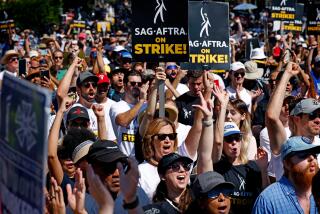Treaty Vote Distresses Hollywood
- Share via
For Hollywood, the decision this week by delegates to a key United Nations agency to back a treaty to promote cultural diversity is reading like the script to a bad sequel.
On Friday, the Motion Picture Assn. of America trade group warned in a statement that the U.N. Educational, Scientific and Cultural Organization accord was protectionism in disguise, the latest attempt by some countries to enact barriers that could allow them to restrict the importing of American movies and music.
“Our biggest concern is that countries will try to use this convention to close their borders to a whole host of foreign products, ideas and information,” MPAA Chairman Dan Glickman said in an interview.
Hollywood has long fought with European countries, especially France, over cultural protectionism. Since the early 1990s, more than half of Hollywood’s ticket sales have come from foreign markets, prompting complaints that competition from big Hollywood studios threatens the viability of the foreign film business. U.S. officials have countered that restrictions and quotas unfairly prevent films from being shown and that consumers should be free to watch what they want.
On Thursday, delegates at UNESCO in Paris voted 148 to 2 to support the cultural diversity treaty, saying it would help countries defend their national cultures against a tide of globalization. Only the U.S. and Israel voted no.
Pushed by the European Union and Canada, the accord, which must be ratified by 30 member states, declares the right of countries to “maintain, adopt and implement policies and measures they deem appropriate for the protection and promotion of the diversity of cultural expressions in their territory.”
The fight comes just two years after the United States rejoined the U.N. cultural agency, ending a 19-year boycott over complaints that the organization was anti-American.
Louise Oliver, the U.S. ambassador to UNESCO, criticized the agreement as “too open to misinterpretation” to support. She called the outcome “extraordinarily disappointing” and said it could have lasting consequences on relations between the U.S. and UNESCO.
U.S. officials and entertainment executives complained that the treaty could stifle free speech by giving dictators an excuse to restrict the free flow of ideas, and that countries might use the treaty to undermine agreements under the World Trade Organization. The U.S. proposed amendments to the deal, but all were rejected.
“We’re going to have to monitor this closely to make sure this doesn’t become a serious problem,” Glickman said.
France, which imposes quotas on national and foreign movies and strongly backed the treaty, praised the vote.
“This is major progress in a world which must protect cultural diversity and organize a dialogue of cultures that respects all,” French President Jacques Chirac said.
Timothy Craddock, the British delegate to UNESCO, also praised the vote.
“With this convention, cultural diversity, currently under threat particularly in the poorest countries, will become a right we all share,” he said. “Just as much as we shall all share the duty to preserve it.”
*
Associated Press was used in compiling this report.
More to Read
The biggest entertainment stories
Get our big stories about Hollywood, film, television, music, arts, culture and more right in your inbox as soon as they publish.
You may occasionally receive promotional content from the Los Angeles Times.











